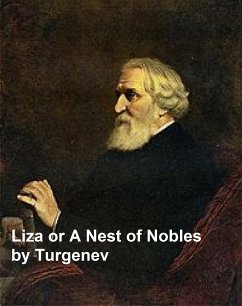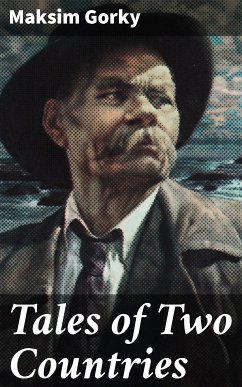
Liza; Or, "A Nest of Nobles" (eBook, ePUB)
Enriched edition. Love, Duty, and Social Conventions in 19th-Century Russia
Kommentar: Kirkland, Jenna / Redaktion: Good Press / Übersetzer: Ralston, William Ralston Shedden
Versandkostenfrei!
Sofort per Download lieferbar
0,49 €
inkl. MwSt.
Weitere Ausgaben:

PAYBACK Punkte
0 °P sammeln!
In Ivan Sergeevich Turgenev's "Liza; Or, 'A Nest of Nobles,'" the intricate dynamics of 19th-century Russian society are astutely examined through the lens of familial tensions and romantic entanglements. Turgenev employs a lyrical prose style, rich with vivid imagery and poignant dialogue, to explore themes of class struggle, personal agency, and the encroachment of modernity on traditional values. Set against the backdrop of the Russian gentry, the narrative immerses readers in a world fraught with emotional depth and societal critique, reflecting the author's keen observations of human natu...
In Ivan Sergeevich Turgenev's "Liza; Or, 'A Nest of Nobles,'" the intricate dynamics of 19th-century Russian society are astutely examined through the lens of familial tensions and romantic entanglements. Turgenev employs a lyrical prose style, rich with vivid imagery and poignant dialogue, to explore themes of class struggle, personal agency, and the encroachment of modernity on traditional values. Set against the backdrop of the Russian gentry, the narrative immerses readers in a world fraught with emotional depth and societal critique, reflecting the author's keen observations of human nature and social constructs of his time. Turgenev, a seminal figure in Russian literature, was born into a landowning family during a period of immense social change. His experiences with the Russian aristocracy and his own conflicts between personal desires and societal expectations deeply informed his writing. "Liza" offers a nuanced perspective, likely drawn from Turgenev's lived experiences and his empathetic understanding of both the nobility and the serfs, showcasing his dedication to portraying the human condition with sensitivity and realism. For readers interested in the intersections of love and social class, "Liza; Or, 'A Nest of Nobles'" is an essential addition to the canon of Russian literature. Turgenev's masterful storytelling invites contemplation of timeless themes, making this novel a profound exploration of identity and belonging that remains relevant today. In this enriched edition, we have carefully created added value for your reading experience: - A succinct Introduction situates the work's timeless appeal and themes. - The Synopsis outlines the central plot, highlighting key developments without spoiling critical twists. - A detailed Historical Context immerses you in the era's events and influences that shaped the writing. - An Author Biography reveals milestones in the author's life, illuminating the personal insights behind the text. - A thorough Analysis dissects symbols, motifs, and character arcs to unearth underlying meanings. - Reflection questions prompt you to engage personally with the work's messages, connecting them to modern life. - Hand-picked Memorable Quotes shine a spotlight on moments of literary brilliance. - Interactive footnotes clarify unusual references, historical allusions, and archaic phrases for an effortless, more informed read.
Dieser Download kann aus rechtlichen Gründen nur mit Rechnungsadresse in A, B, BG, CY, CZ, D, DK, EW, E, FIN, F, GR, H, IRL, I, LT, L, LR, M, NL, PL, P, R, S, SLO, SK ausgeliefert werden.













